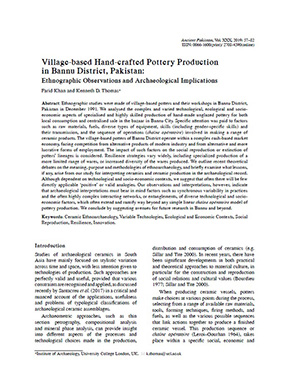Village-based Hand-crafted Pottery Production in Bannu District, Pakistan
Ethnographic Observations and Archaeological Implications
Keywords:
Ceramic Ethnoarchaeology, Variable Technologies, Ecological and Economic Contexts, Social Reproduction, Resilience, InnovationAbstract
Ethnographic studies were made of village-based potters and their workshops in Bannu District, Pakistan in December 1991. We analysed the complex and varied technological, ecological and socioeconomic aspects of specialised and highly skilled production of hand-made unglazed pottery for both local consumption and centralised sale in the bazaar in Bannu City. Specific attention was paid to factors such as raw materials, fuels, diverse types of equipment, skills (including gender-specific skills) and their transmission, and the sequence of operations (chaîne opératoire) involved in making a range of ceramic products. The village-based potters of Bannu District operate within a complex cash-based market economy, facing competition from alternative products of modern industry and from alternative and more lucrative forms of employment. The impact of such factors on the social reproduction or extinction of potters’ lineages is considered. Resilience strategies vary widely, including specialized production of a more limited range of wares, or increased diversity of the wares produced. We outline recent theoretical
debates on the meaning, purpose and methodologies of ethnoarchaeology, and briefly examine what lessons, if any, arise from our study for interpreting ceramics and ceramic production in the archaeological record. Although dependent on technological and socio-economic contexts, we suggest that often there will be few directly applicable ‘positive’ or valid analogies. Our observations and interpretations, however, indicate that archaeological interpretations must bear in mind factors such as synchronous variability in practices and the often highly complex interacting networks, or entanglements, of diverse technological and socioeconomic factors, which often extend and ramify way beyond any simple linear chaîne opératoire model of pottery production. We conclude by suggesting avenues for future research in Bannu and beyond.

Downloads
Published
How to Cite
Issue
Section
License
Copyright (c) 2019 Ancient Pakistan

This work is licensed under a Creative Commons Attribution-NonCommercial 4.0 International License.
All Rights Reserved © Department of Archaeology, University of Peshawar




